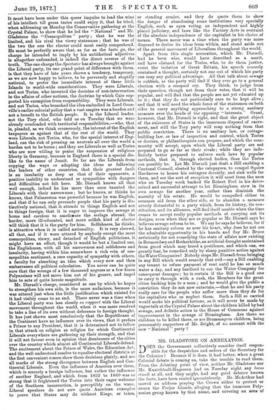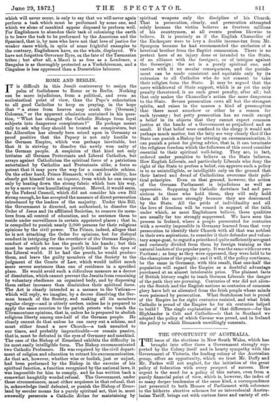MR. GLADSTONE ON ANNEXATION.
DOES the Government collectively consider itself respon- sible for the despatches and orders of the Secretary for the Colonies ? Because if it does, it had better, when a great Colonial debate is coming on, take the trouble to read them. From the debating point of view, neither Mr. Gladstone nor Mr. Knatchbull-Hugessen had on Tuesday night any locus standi at all, and they might, had any good debater known the facts, have been routed ignominiously. Mr. McArthur had moved an address praying the Crown either to protect or annex the Feejee Islands, alleging that the immense Poly- nesian group known by that name, and covering an area of 40,000 square miles, were worth having ; that they were fall- ing under a nondescript Government administered, or at all events influenced, by disreputable Englishmen ; and that they were peopled by a race who would welcome any regular and powerful authority. Mr. McArthur made out a fair case, and was well supported by Mr. Eastwick ; but the Premier, who thinks Great Britain already overburdened with territories, who dreads Colonial wars, and who, we are told, was aware of M. Thiers' deep jealousy of any extension of English influence in Polynesia, resisted the motion, and produced a string of arguments which would have been excellent if we had done nothing in the matter before, but which, if read by the light of Lord Kimberley's despatches, were all open to a conclusive answer. It is, for instance, an excellent answer to a project of annexation to say that the population do not wish it, though we should deny the moral right of the savage races to exemption from the vivifying control of the civilised Powers ; but Lord Kimberley early in the year had formally sanctioned the annexation of the islands by the Colony of New South Wales. Mr. Knatchbull-Hugessen admitted that in this very debate, and in so many words, saying that the Colonial Office "had proposed to the Australian Colonies" that solution of the difficulty. If it is unjust or immoral for Eng- land to assume the government of a savage race without a plebiscite, it is equally unjust and immoral to authorise a Colony to do that very thing. There is no difference of prin- ciple whatever, or rather the only difference is against the Government ; for whereas it is sure of itself and its agents, sure that it does not mean to oppress, or wish to degrade, or desire to plunder, it is not equally sure that the Colony which it cannot fully control may be governed by its own high motives. Why should Victoria or New South Wales be so much more merciful than the State of Colorado, which is ready, if allowed, to clear all Indians off the face of the earth ? It is an excellent argument to say there are 140,000 native Feejeeans, and their government may cost as much as the government of the Maories once did ; but if we included Feejee in Victoria, we must in the long run help the Victorians if they got into any military mess. We cannot allow our subjects to be defeated, and a piece of British territory given up to anarchy just because there is 'a local authority between us and the rebel tribes. We might as well have condoned the Mutiny because it was immediately directed against the East India Company. Mr. McArthur had said that our sovereignty in the islands would preserve the native race, and Mr. Gladstone's retort that the Maories had not been preserved seemed to the audience a crushing one ; but it was almost absurd, when we remember that the natives had been officially handed over to colonists exactly like the colonists of New Zealand. The truth is, that the absolute rule of the British Government has been found consistent with the preservation of a dark race, as in India, and Ceylon, and Guiana, and the Jamaica of to-day, and that Colonial rule has not been found so consistent, Lord Kimberley's proposal being therefore much worse, from the philanthropic point of view, than Mr. McArthur's. It is quite fair in the Premier to groan over any increase of our national "responsibilities," for he does not believe, as we do, that in those responsibilities is the antiseptic of a race which but for them would be abjectly devoted to the pursuit of comfort, but it is not fair to forget that his colleague had sanctioned in a bad way the increase he himself deprecated with such painful zeal.
The Premier, in fact, had no official case at all, and we can- not say that his arguments, even when considered apart from his colleagues' action, produce in our minds any final or im- movable conviction. He misses the moral question at issue too completely, more completely than he would miss it if he had ever realised what an independent white government among a dark race really means. That question is our right to allow our people to go blundering about the planet exhibit- ing their almost unintelligible and most terrible faculty for subjugating dark races, without the slightest control from the representatives of the nation to which they belong. Did Mr. Gladstone ever read Macaulay's perfectly truthful description of the Government of Bengal in the six years during which the white men were released from control or did he ever hear how Rajah Brooke, a soldier, a statesman, and a philanthropist, but also an independent white sovereign ruling dark races, put down the Chinese rebellion in Sarawak ? or has he forgot- ten how the aristocracy of South Carolina "held their own" among their black agriculturists? The white men are in the the Feejee Islands ; they find they can make money there ; they have organized some sort of a Government there ; and as surely as they come of our race, so surely that Government will prevail, will beat down all resistance, will contract the fierce Anglo-Saxon hate and scorn of its dark opponents, and will, in one way or another, either by labour laws, or by recognising slavery, or by expulsion to reserved islands, reduce the hostile natives to a pauperised condition of vassalage,—that is, will inflict on them a fate infinitely worse than the extermination, which if it comes, as in New Zealand it comes, from natural ceases, is only to be regretted because with each race of man that passes from earth there passes a possibility of unknown good. Have we any right to decree that our countrymen, once settled in uncivilised lands, shall, whatever the conse- quences to mankind, be released from civilised laws, placed above all civilised duties, allowed to work their will on the people and each other without restraint We deny it absolutely, yet that is the result of our refusal to follow them to a terri- tory like Feejee, to place above them a representative of the only authority which they can either be induced to respect or compelled to obey. Annexation is so costly ? We dis- believe the cost. The islands are growing the best cotton on earth, and will grow some of the best tobacco, and wherever those two staples exist, an export duty will always provide a speedy revenue ; but granting the cost, cost is no argument for shirking our clear duty. They are so- valueless ? They are the half-way house to the Southern Continent, have har- bours, as Lord Palmerston said, unmatched in the world, cover the area of Ireland, and would hold' more people than now exist upon the Australian continent, are entirely separated from the world, and can be defended by sea. Why should they cost more than Ceylon, which imports British goods to the extent of 28 per head per annum? Mr. Knatchball- Hugessen says their possession may lead to the possession of other groups, and that is quite conceivable ; but if it led to our possession of all Polynesia, what is that but benefit to mankind, and to the race which from every new possession seems to acquire new force, new capacity for self-government, and new and deeper feeling of its responsibilities towards those whom Providence places under its control ? The "weary Titan," says Matthew Arnold, staggers under the load of " the too vast orb of his fate," but the splendid figure which has wrought such mischief in depressing political courage is capable of a double interpretation. Does Mr. Gladstone love the unloaded Titan who challenges the Gods? The root of all this dread of extending our possessions which, thanks to steam and electricity, diminish in magnitude every day, is not morality, but fear, fear of the task which, if we have a task devolved on us by Providence is most especially ours, that of utilising the earth, and preparing it for the civilisation which is yet to come.
A good deal was said during the debate of the native willingness or unwillingness to accept our rule, and Mr. Glad- stone laid it down as a principle that we should never again acquire a territory without the consent of its inhabitants, but surely that new policy requires some qualification. Have we a possession in the world inhabited by any race other than our own from which a plebiscite, if honestly taken, would not at once expel us? Even as regards new possessions there must be at least two qualifications to the absolute right of independ- ence,—that the aborigines shall be competent to form an opinion as to their own best welfare, and that the world shall not be injured by their otherwise just pretensions. America could not be left to barbarism because the Red tribes declared in the most emphatic and unmistakable manner that they objected to the white man's presence, and the Negritos of Papua have no better right to their barbaric isolation than the Cherokees or the Caribs. That we are bound to govern such races well, to preserve them if we can, to protect them from all oppression, and possibly even from the temptations which too often accompany our immi- grants, is beyond question ; but it does not follow that we are bound to abstain from governing them at all, still less that we are bound to hand over that function to uncontrolled adventurers. That there are races in the world which wither before our approach as flies wither before the cold is no doubt a strange and it may be a saddening fact in the history of mankind, but that incapacity of survival is no reason for leaving to them great regions which, owing to that incapacity, they are unable to use. We owe a duty to humanity as well as a duty to savages, and that duty is not fulfilled when we leave the fairest places of earth in the possession of men to whom they are useless, and who, if they knew their own highest interest, would desire our control. To say that we will never again extend our possessions except on a condition which will never occur, is only to say that we will never again perform a task which must be performed by some one, and which we alone of mankind appear disposed to perform well. For Englishmen to abandon their task of colonising the earth is to leave the task to be performed by the American and the Spaniard, that is, by men who have not that love of justice for weaker races which, in spite of some frightful examples to the contrary, Englishmen have, on the whole, displayed. We have not forgotten Governor Eyre, oz the fate of the Tasmanian tribes ; but after all, a Maori is as free as a Londoner, a Bengalee is as thoroughly protected as a Yorkshireman, and a Cingalese is less oppressed than a Dorsetshire labourer.




































 Previous page
Previous page